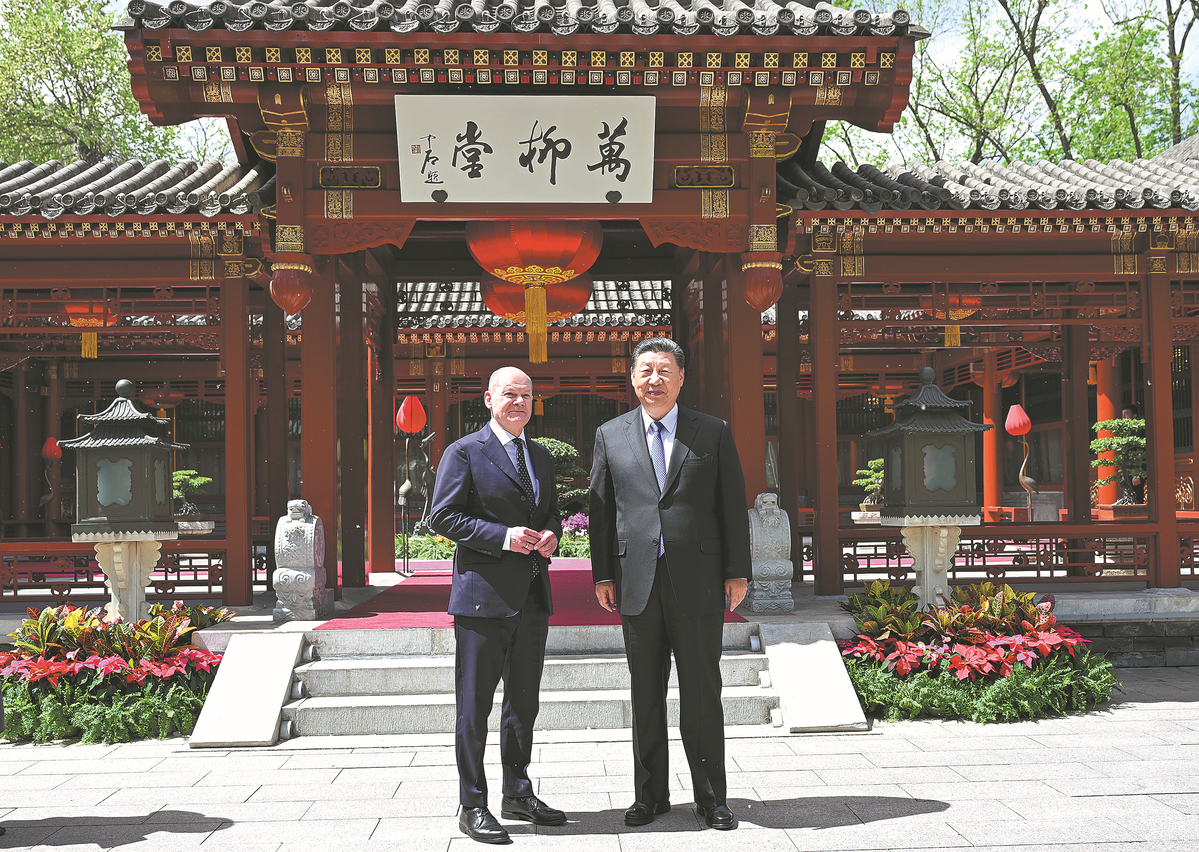Vast potential seen in exploring ties in emerging fields

President Xi Jinping meets with German Chancellor Olaf Scholz on Tuesday at the Diaoyutai State Guesthouse in Beijing. XIE HUANCHI/XINHUA
Mutually beneficial cooperation between China and Germany creates no "risks", but serves as a guarantee for their stable relations and presents opportunities for future development, President Xi Jinping said on Tuesday when meeting in Beijing with German Chancellor Olaf Scholz.
Scholz was on a three-day official visit to China, which started on Sunday. His trip came after Germany's federal government pushed for a "de-risking" policy in July to reduce "economic reliance" on China.
Xi emphasized the deep interconnection of the industrial and supply chains between the two countries as well as the high-level market interdependence.
He said that there is vast potential for them to explore win-win cooperation, not only in traditional sectors such as machine manufacturing and the automotive industry, but also in emerging fields including green transformation, digital development and artificial intelligence.
Noting that both China and Germany support free trade and economic globalization, Xi urged the countries to be vigilant against rising protectionism and view the issue of production capacity objectively in line with economic principles.
China has made significant contributions to addressing global supply challenges, inflation pressures and climate change through exports of electric vehicles, lithium batteries and photovoltaic products, he said.
Xi noted that there is no fundamental conflict of interest between China and Germany, and they do not pose a security threat to each other.
Cooperation between the two countries is beneficial for both sides as well as for the world, he said, adding that the more turbulent the world becomes, the more important it is for both sides to enhance the resilience and vitality of their bilateral relationship.
China and Germany should uphold independence and autonomy in engaging in multilateral cooperation, and jointly promote practical actions from the international community to address global challenges, such as climate change, imbalanced development and regional conflicts, contributing more to the balance and stability of the world, Xi said.
While reiterating China's commitment to opening-up, Xi urged Germany to provide a fair, transparent, open and nondiscriminatory business environment for Chinese enterprises.
Scholz said that Germany is willing to further strengthen bilateral relations with China and deepen bilateral dialogue and cooperation in various fields. Germany is committed to upholding a multilateral international order, while rejecting confrontation and advocating free trade, he said.
As an important member of the European Union, Germany is willing to play an active role in promoting the positive development of EU-China relations, Scholz added.
The visiting German delegation included the federal ministers of environment, agriculture and transportation, as well as many German business leaders, including executives from BMW, Bayer, Mercedes-Benz, Siemens and ThyssenKrupp.
Ola Kaellenius, chairman of the board of management of Mercedes-Benz Group AG, told China Daily that China plays a pivotal role in Mercedes-Benz's global strategy, serving not only as the home of its largest market and one of its largest manufacturing sites, but also as one of its global centers for technological innovation.
"We will continue to invest in China, strengthen cooperation with our Chinese partners, promote electrification as well as digital transformation, and continue to contribute to Germany-China economic and trade cooperation," he said.
During the meeting, Xi and Scholz also exchanged views on the Ukraine crisis, the Palestine-Israel conflict and other issues of common interest.
On the Ukraine crisis, both leaders expressed their commitment to upholding the purposes and principles of the United Nations Charter, opposing the use of nuclear weapons or attacks on nuclear facilities that are used for peaceful purposes, and addressing food security issues in accordance with international humanitarian law.
Xi proposed four principles to prevent the Ukraine crisis from spiraling out of control and to restore peace at an early date.
"First, we should prioritize the upholding of peace and stability and refrain from seeking selfish gains. Second, we should cool down the situation and not add fuel to the fire. Third, we need to create conditions for the restoration of peace and refrain from further exacerbating tensions. Fourth, we should reduce the negative impact on the world economy and refrain from undermining the stability of global industrial and supply chains," he said.
Xi encouraged and supported all efforts conducive to a peaceful resolution of the Ukraine crisis, expressing China's willingness to maintain close communication with relevant parties, including Germany, regarding the timely convening of an international conference accepted by both Russia and Ukraine, with equal participation from all relevant parties for fair discussions on all peace proposals.
On the Palestine-Israel conflict, both sides agreed on the implementation of UN Security Council Resolution 2728 to prevent further escalation of the situation, ensure unimpeded and sustainable humanitarian access to the Gaza Strip, and support the early negotiation-based resolution of the Palestinian issue on the basis of the two-state solution.
They also called on influential countries to play a constructive role in maintaining regional peace and stability, and to push for a comprehensive, just and lasting solution to the Palestinian issue.
-
Forum set to deepen BRI ties and promote infrastructure
Forum set to deepen BRI ties and promote infrastructure
-
A new world opens up with bias left at the door
A new world opens up with bias left at the door
-
Medical insurance fund remains strong, despite aging population
Medical insurance fund remains strong, despite aging population
-
Friendly travel policies push inbound tourism surge
Friendly travel policies push inbound tourism surge